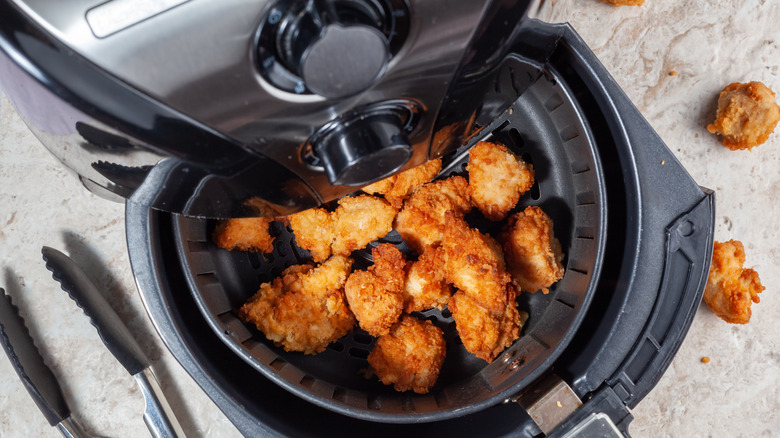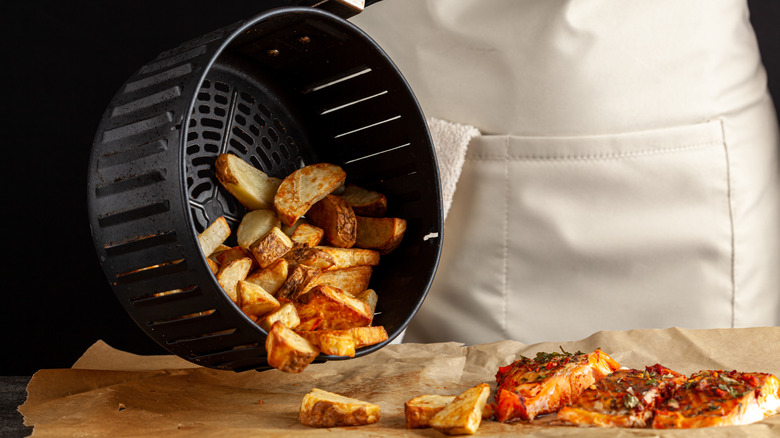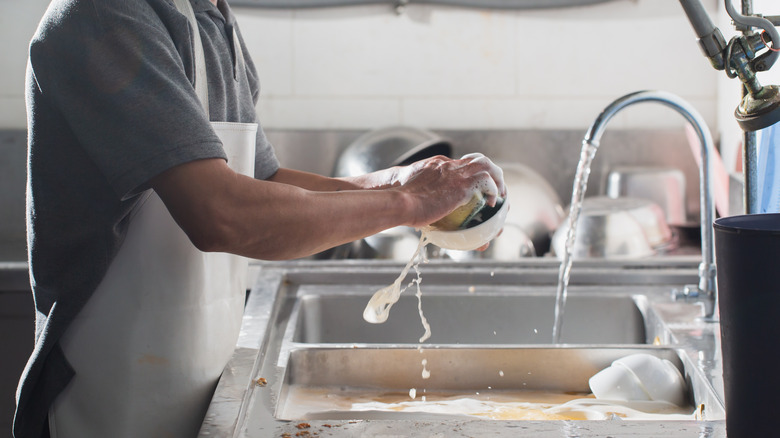The Reason A Dirty Air Fryer Can Be Dangerous
If you're a home cook with any level of expertise, from the casual snack maker to the multi-course-producing chef, you've likely encountered the extremely popular air fryer. Since its initial release by Philips in 2010 (via New Atlas), this handy dandy kitchen appliance has been revolutionizing meal times to the tune of impossibly crispy air fryer french fries and stuffed chicken breast that cooks in less than 30 minutes.
We can thank Dutch inventor Fred van der Weij for coming up with this device, according to New York Times. Mr. Van der Weij faced the same problem as many of us — trying to achieve crispy, but not dried out, french fries without using a deep fryer. Following his dissatisfaction with other cooking methods, he began to develop the fast-cooking, fat-reducing, dare we say life-changing air fryer. And we're glad he did! According to the NPD Group, in 2020 and 2021, air fryer sales have reached a whopping 25.6 million units sold in the United States alone.
The convenience of the air fryer is pretty stellar, but it won't last forever if you're not willing to put in the proper care. Cleaning your air fryer between uses is nothing short of essential. Good Housekeeping warns that a dirty air fryer can really start to smell and may even begin smoking, but it can also be dangerous to your health.
Increased risk of foodborne illness and cross-contamination
You probably don't clean your microwave or oven after every use, so it's understandable that neglecting to wipe out your air fryer sounds like no big deal. Unfortunately, according to Jackie Newgent, RDN, CDN, allowing your air fryer to become dirty means you're creating an environment for foodborne illnesses to develop (via Livestrong).
For example, let's say you cooked a salmonella-infected piece of chicken in your air fryer, but it's slightly undercooked and unsafe to eat. The air fryer wouldn't have killed all of the bacteria, and the salmonella could still infect another food item, or yourself. Most salmonella can remain infectious for up to 32 hours on a dry surface (via USDA). The same goes for E. coli, which can, according to Cleveland Clinic, survive for even longer outside of the body. Properly cleaning your air fryer can eliminate the threat of infectious bacteria spreading to your foods and yourself.
Cross contamination is another issue that can arise from a dirty air fryer. Given the nature of the air fryer's convection-style cooking, special consideration is necessary when preparing meals for people with food allergies. However, cleaning your air fryer thoroughly enough to eliminate all traces of the previous foods can be very difficult. According to the Gluten Intolerance Group, gluten-sensitive people should use a separate air fryer for gluten-free food to avoid the risk of cross-contamination with gluten-containing foods. Execute the same precautions with other food allergies as well.
How to clean your air fryer
So what's the best way to wash all the junk out of your air fryer? First, the Kitchn recommends you unplug your device, then use a damp cloth to wipe the outside of the air fryer before getting to the messy inside. After you wipe out the inside, you can pop the air fryer basket in your dishwasher or let it soak in hot and soapy water in your sink to loosen up any leftover food debris. Take a non-abrasive sponge to any surfaces with remaining splatter, and rinse all parts well after.
You can either use a clean cloth to dry the freshly cleaned parts or return your air fryer basket to your kitchen counter to air dry, so it's ready for the next time you want to use it. Regularly cleaning your air fryer only takes a few minutes of your time, but it can help keep your air fryer and your body happy for years to come.


